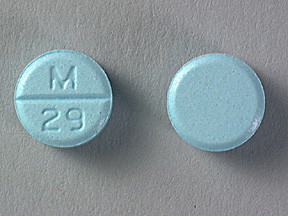METHYCLOTHIAZIDE - ORAL
PHONETIC PRONUNCIATION: (meth-i-kloe-THIGH-uh-zide)
COMMON BRAND NAME(S): Enduron
GENERIC NAME(S): methyclothiazide
Uses
USES: This medication is used to treat high blood pressure. Lowering high blood pressure helps prevent strokes, heart attacks, and kidney problems. Methyclothiazide is a "water pill" (diuretic) that causes your body to get rid of extra salt and water. This increases the amount of urine you make. This medication also reduces extra fluid in the body (edema) caused by conditions such as congestive heart failure, liver disease, and kidney disease. Getting rid of extra water helps to reduce fluid in the lungs so that you can breathe easier. It also helps to decrease swelling of the arms, legs, and stomach/abdomen.
How to use METHYCLOTHIAZIDE - ORAL
HOW TO USE: Take this medication by mouth with or without food, usually once daily or as directed by your doctor. It is best to avoid taking this medication within 4 hours of your bedtime to avoid having to get up to urinate. Consult your doctor or pharmacist if you have questions about your dosing schedule. The dosage is based on your medical condition and response to therapy. The manufacturer recommends that you do not take more than 10 milligrams as a single daily dose to treat edema or more than 5 milligrams daily to treat high blood pressure. Use this medication regularly in order to get the most benefit from it. To help you remember, take it at the same time each day or as prescribed. Do not increase your dose, skip doses, or stop taking this medication unless directed by your doctor. It is important to continue taking this medication even if you feel well. Most people with high blood pressure do not feel sick. For the treatment of high blood pressure, it may take up to several weeks before the full benefit of this drug takes effect. Cholestyramine and colestipol can decrease the absorption of this medication by your body. If you are taking either of these drugs, separate them from methyclothiazide by at least 4 hours. Inform your doctor if your condition does not improve or if it worsens (e.g., swelling increases, your routine blood pressure readings increase).
Side Effects
Precautions
Interactions
Overdose
Images
Reviews
Faq for METHYCLOTHIAZIDE - ORAL
Methyclothiazide is an oral medication belonging to the class of drugs known as thiazide diuretics. It is primarily used to treat high blood pressure (hypertension) by helping the body eliminate excess water and salt.
Methyclothiazide works by increasing the amount of urine produced by the kidneys, which helps to reduce fluid retention and lower blood pressure. It does this by blocking the reabsorption of sodium and chloride in the kidneys.
Common side effects of methyclothiazide include increased urination, dizziness, lightheadedness, nausea, stomach upset, headache, and muscle cramps. These side effects are usually mild and go away on their own.
While rare, some serious side effects may occur with methyclothiazide. These can include severe allergic reactions, electrolyte imbalances, kidney problems, liver dysfunction, and changes in blood sugar levels. It is important to seek immediate medical attention if you experience any severe or persistent side effects.
Methyclothiazide is not recommended for use during pregnancy as it may harm the unborn baby. It is also not recommended for use while breastfeeding as it may pass into breast milk and harm the nursing infant. Consult with your doctor for alternative medications if you are pregnant or breastfeeding.
Methyclothiazide may interact with certain medications or substances, including other blood pressure medications, nonsteroidal anti-inflammatory drugs (NSAIDs), lithium, corticosteroids, and some cholesterol-lowering drugs. Be sure to inform your healthcare provider about all the medications, supplements, and herbal products you are taking.
Methyclothiazide is usually taken once a day, either in the morning or as directed by your doctor. It can be taken with or without food. Follow the instructions provided by your doctor or pharmacist.
If you miss a dose of methyclothiazide, take it as soon as you remember. However, if it is close to the time for your next dose, skip the missed dose and resume your regular dosing schedule. Do not double the dose to make up for a missed one.
Methyclothiazide may start working within 1 to 2 hours after taking it. However, it may take several weeks for the full effects of the medication to be noticeable. Continue taking it as directed even if you feel well.
- Methyclothiazide is primarily used to treat high blood pressure (hypertension) and to reduce excessive fluid buildup in the body (edema) caused by conditions such as heart failure or liver disease.
- Methyclothiazide may interact with other medications, including nonsteroidal anti-inflammatory drugs (NSAIDs), lithium, corticosteroids, diabetes medications, and certain heart medications. It is essential to inform your doctor or pharmacist about all the medications you are currently taking to avoid any potential interactions.
- Methyclothiazide should be used during pregnancy only if clearly needed and under the guidance of a healthcare professional. It is not recommended for use during breastfeeding as it may pass into breast milk.
- It is generally not recommended to stop taking methyclothiazide suddenly without consulting your doctor. Abruptly stopping the medication may lead to a significant increase in blood pressure or fluid retention.
Disclaimer
IMPORTANT: HOW TO USE THIS INFORMATION: This is a summary and does NOT have all possible information about this product. This information does not assure that this product is safe, effective, or appropriate for you. This information is not individual medical advice and does not substitute for the advice of your health care professional. Always ask your health care professional for complete information about this product and your specific health needs.

No Reviews Yet